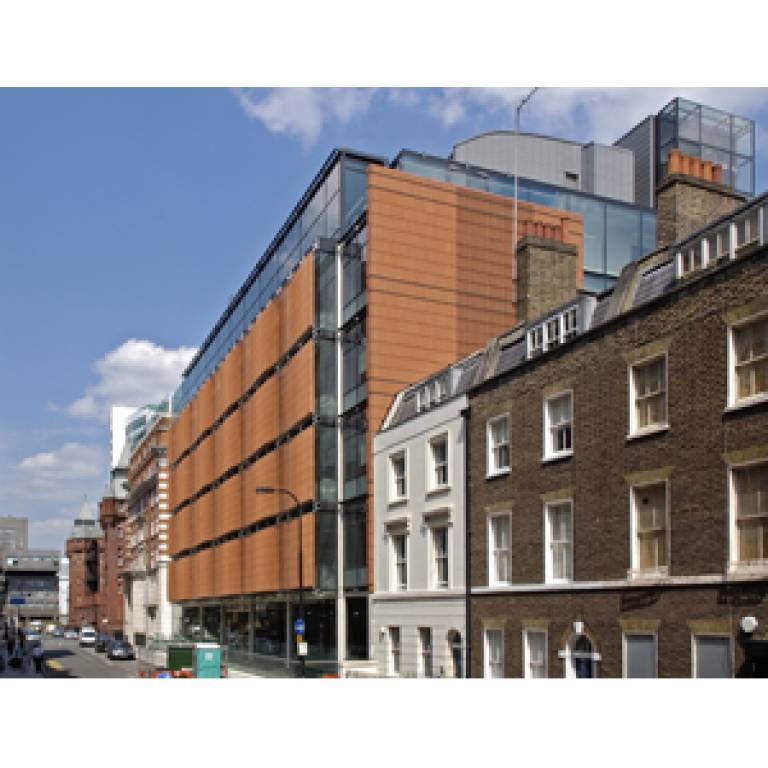Blood test provides 'snapshot' of tumour drug response
4 June 2012
Counting the number of tumour cells in blood samples taken before and after treatment for advanced neuroendocrine tumours could provide a 'snapshot' of how well patients are responding within weeks of starting treatment, according to results from a study being presented at the American Society for Clinical Oncology cancer conference today (Monday).

The study, coordinated by researchers from the Cancer Research UK and NIHR Experimental Cancer Medicine Centre (ECMC) at UCL Cancer Institute, is the largest of its kind and the first to demonstrate how monitoring cancer cells circulating in the blood can be used to predict treatment success for this rare cancer-type, which most commonly affects the gut or pancreas.
Patients found to have circulating tumour cells (CTCs) in the blood at the start of treatment were around eight times more likely to die from their disease, compared to those with undetectable CTC levels.
Study leader Dr Tim Meyer, who directs UCL ECMC, said: "By using state-of-the-art technology to count individual tumour cells circulating in the blood stream, we've been able to show how a simple blood test could help monitor treatment response and predict how fast the disease will progress. Doctors normally rely on CT or MRI scans to tell them if a treatment is working, but cutting-edge CTC testing can provide an overall snapshot of the tumour's development, without the need to wait for changes in its size to become visible on scans.
By using state-of-the-art technology to count individual tumour cells circulating in the blood stream, we've been able to show how a simple blood test could help monitor treatment response and predict how fast the disease will progress.
Dr Tim Meyer, NIHR Experimental Cancer Medicine Centre at UCL Cancer Institute
"Although these findings are preliminary, CTC
testing is already showing promise in advanced breast, prostate and colorectal
cancers and, on the basis of these results, is being incorporated into several
trials involving patients with neuroendocrine cancers. This will help uncover ways of determining the impact of treatment on a cellular level, helping tailor treatment to individual patients."
The researchers analysed blood samples from 118 patients with advanced neuroendocrine cancers attending the Royal Free Hospital. They compared the numbers of individual tumour cells present in samples taken before and after treatment.
Patients whose CTC levels fell by more than two thirds within five weeks of starting a new treatment tended to have the best outcomes, while those whose CTC levels rose by more than a third did the worst.
Dr Joanna Reynolds, Cancer Research UK's director of centres, said: "This is a great example of how the Experimental Cancer Medicine's Network is supporting cutting-edge research into rarer cancer types. Advanced cancers often consist of lots of smaller tumours around the body, many of which will be too tiny to be picked up by traditional imaging techniques, making it difficult to judge how well a drug is working. This study highlights a potential way to monitor response in real time across all cancer sites, so doctors know sooner if a treatment isn't working. Although at an early stage, this is an exciting area of research and we look forward to seeing how it progresses."
This research was supported by the NIHR University College London Hospitals Biomedical Research Centre.
Image caption: UCL Cancer Institute
Media contact: David Weston
Notes:
About the ECMC Network The Experimental Cancer Medicine Centre (ECMC) network is jointly supported by Cancer Research UK, the National Institute for Health Research in England, and the Departments of Health of Scotland, Wales and Northern Ireland. It launched in 2006, with £35M funding over five years, with a further £35M announced in 2011 for five more years to fund centres across the UK. Each ECMC brings together lab-based experts in cancer biology with cancer doctors to speed up the flow of ideas from the lab bench to the patient's bedside. Find out more at www.ecmcnetwork.org.uk
About the NIHR The National Institute for Health Research provides the framework through which the research staff and research infrastructure of the NHS in England is positioned, maintained and managed as a national research facility. The NIHR provides the NHS with the support and infrastructure it needs to conduct first-class research funded by the Government and its partners alongside high-quality patient care, education and training. Its aim is to support outstanding individuals (both leaders and collaborators), working in world class facilities (both NHS and university), conducting leading edge research focused on the needs of patients. http://www.nihr.ac.uk/
 Close
Close

